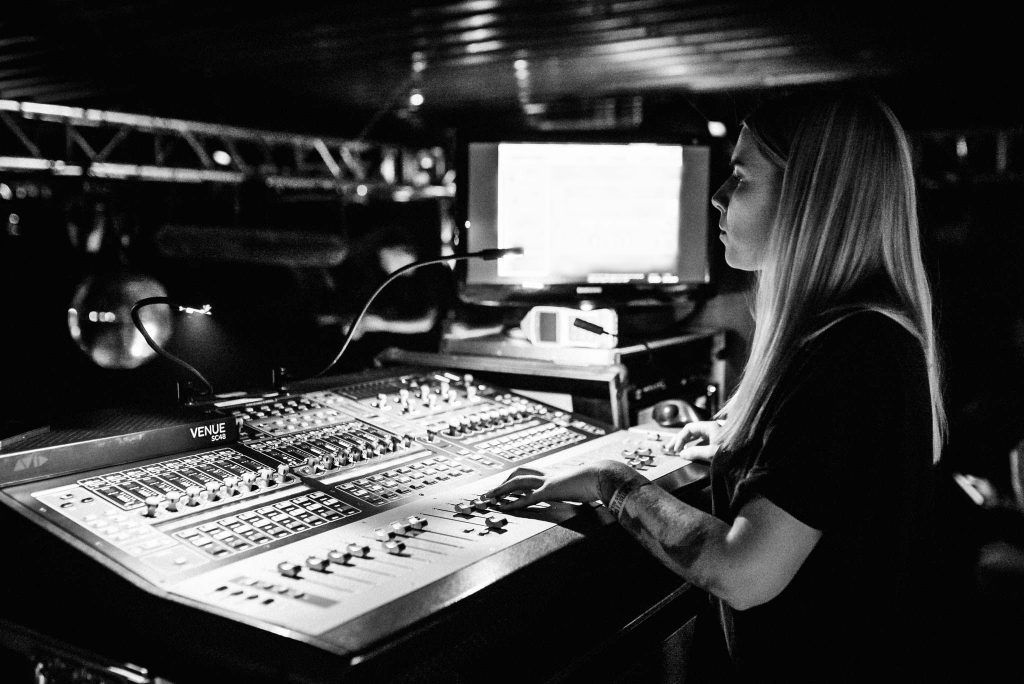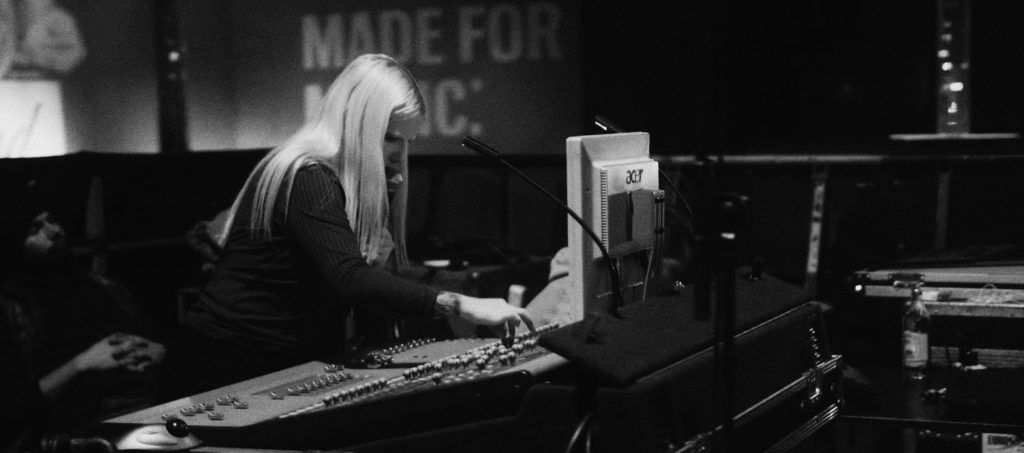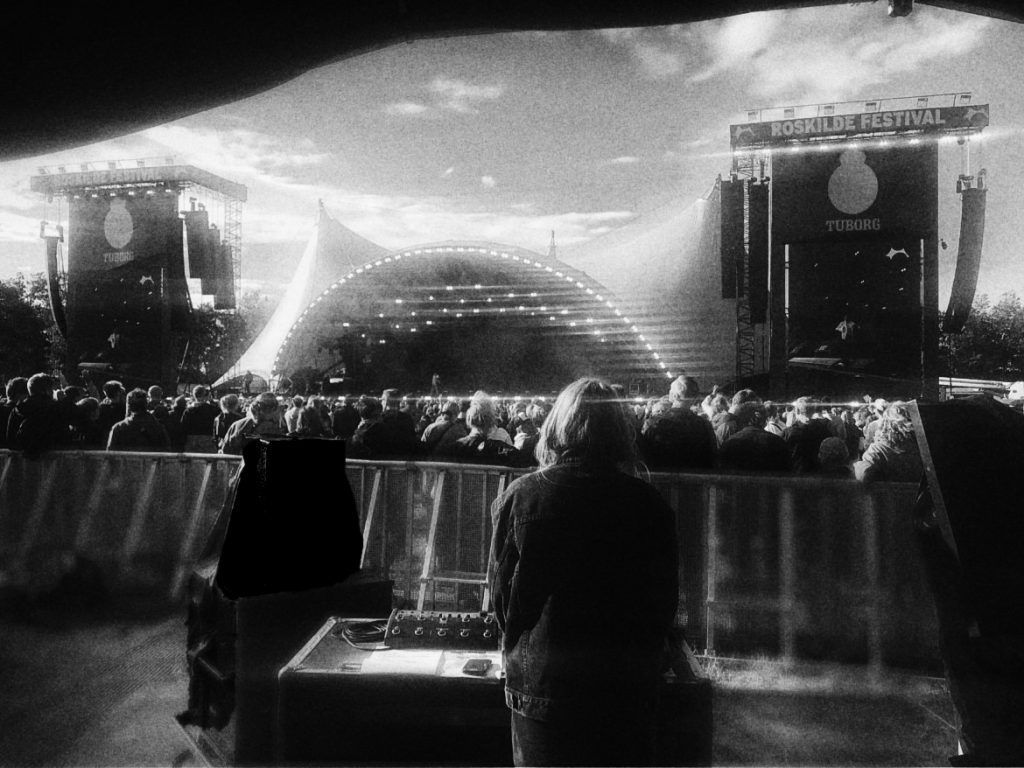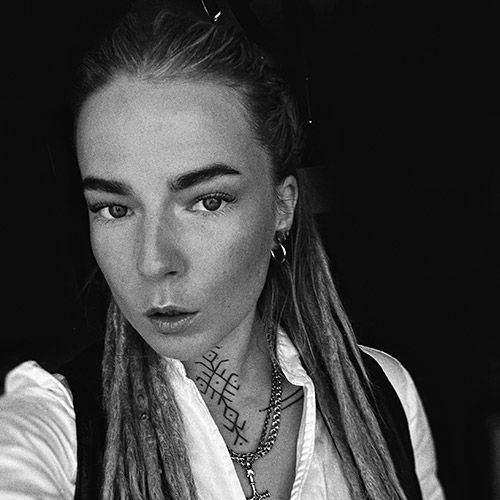Women in Pro Audio: Johanna Gustavsson Women in Pro Audio: Johanna Gustavsson...
“I love living in this parallel universe we call the music industry. Being lost together in different cities and countries creating these mandalas, this piece of art we call a show… There’s nothing like it. To be the space holder for the creatives on stage is something extraordinary that I value and treasure.” – Jo Gustavsson
For this month’s Women in Pro Audio series, we got to catch up with the Swedish sound engineer entrepreneur Johanna Gustavsson. A sound pro who enjoys meditating, doing yoga, nourishing herself with healthy food, and going on adventures surfing or snowboarding, Johanna, who goes by Jo, has been freelancing with her company YES MAM SOUND as a sound engineer (mostly front-of-house) and tour manager for the past ten years.
“It’s me, myself, and I at my company which means that I’m having development interviews in the mirror and can’t get away with anything. (Try running away from your own shadow, you’ll get fit and exhausted!) I mostly tour as a FOH engineer (master of the mix the audience experiences). It’s been taking me all over the world, riding faders in Russia, China, Europe, the UK, and Scandinavia.”
How It Started
Jo got started in the industry similarly to how others get into it: for the love of the music. Or rather, in Jo’s case, for the love of a band member. “I wanted to marry Paul Stanley from KISS when I was around six years old or something. Stay with me here; I promise it might make sense further down the road!” Jo chortles.
“My friends wanted to swim with dolphins or become princesses, but I was exposed to KISS Live behind the scenes on VHS, and I wanted to do THAT. I figured holy matrimony was my way in since I’ve seen these movies where women benefitted from such things. Fast forward ten years later, I found another way into the music industry. It turns out I didn’t have to get married at all!”
It was around that time when Jo was in high school, an engineering program at her school opened, which was “in the middle of nowhere and cow shingles in Sweden,” according to Jo. “Up until this point, I had been consuming the music industry from the cradle where heavy metal was my lullaby, and the guitar was my pony. I made mixed cassettes and daydreamed about another world. So, my first meeting with a sound desk (Yamaha DM1000, bless its soul) was a big bang! It was a big chunk of grey opportunity and questions. What the actual fudge?! What’s a sound engineer? Can I become one?” Jo then explains her plans of abandoning marrying Paul Stanley, “To be fair, I wasn’t going to make it as a rockstar. Paul Stanley seemed to be involved with someone else, and according to my sound engineer teacher, I had a natural gift. I took him at his word and started to skip the other classes to record my classmates’ music; I burned CDs and made album covers in paint. My old man had a friend who worked as a live sound engineer, and I started to shadow him realizing the thrill of live sound at the age of seventeen—with a shaky index finger on the fader and the fear of the monster we call feedback.”
How It’s Going
“Since I discovered sound engineering at sixteen, I used to sit in my classroom daydreaming about someone from the music industry interrupting the class to take me on tour. It was around that time I started to focus all my energy on getting to where I am now. I graduated high school in 2011 at nineteen, and before I turned twenty, I started my freelance career with YES MAM SOUND with nothing but my Sennheiser HD25, which I still use.”
Although, because this industry can be challenging, Jo almost gave up. We’re glad she didn’t.
“This industry often requires you to suppress your own well-being and take risks to serve others. We have this culture of working ourselves to the bone because most of us are very passionate about what we’re doing, and high-performance personalities often leave no room for compassion towards ourselves. Right before the pandemic, I was overworked, and everything felt meaningless, the lifestyle can be rough, and I needed a change. I thought I would put the music industry on the shelf and focus on my newfound career as a tattoo artist. However, after two years away from the industry during the pandemic, I woke up one day, this summer of 2022 actually, and had this fire ignite within, eager to get back to it all—but doing it on my own terms.”
And the reason why she’s still doing it: “I love living in this parallel universe we call the music industry. Being lost together in different cities and countries creating these mandalas, this piece of art we call a show. It’s the sum of the hours of every professional with their own unique expertise narrowed down to this present moment experience—only to tear it all down to start all over again in a new city. It’s just magical and chaotic, draining and energizing all at the same time. There’s nothing like it. To be the space holder for the creatives on stage is something extraordinary that I value and treasure.”

Advice
Jo’s advice regarding sound engineering? “I’m a “musical soundie,” meaning I play it by ear. I’m not a gear kind of girl. The gear is a great tool, don’t get me wrong, but interacting with the energy on stage and always keeping the fingers on the faders—and knowing which finger is controlling what channel—allows you to be visually and organically involved with the performance. Besides being observant, riding faders to enhance the key elements of the performance, and balancing the soundscape, I’m a sucker for the multi-band compressor for vocals in particular since it works dynamically to bring out the character.
“I’m also an advocate for using the EQ as the executioner, wicked messy frequencies that don’t serve any purpose be gone! I dip instead of boosting as a rule of thumb. I find the unwanted frequency of each channel by gaining a narrow Q-value bump, sweeping it across the professionally guessed trouble area, and then dipping the life out of it.
It’s, of course, more than all the above in the finished mix, but it’s been the foundation for my philosophy to keep it simple and authentic to the vision of the band I’m mixing.”
As for a general rule of advice: “Find out what kind of acts you really enjoy and have the integrity of expressing that to your surroundings. It’s something I’ve started doing this year after two years of reflection during the pandemic. I realized how valuable my time is and how I owe it to myself and the productions to be authentic. Being proud of the tour you’re on will give you the strength to walk the extra mile.”
A Lack of Representation
The lack of women in any industry causing less women wanting to get into that industry is one big paradox that’s often overlooked. Because if there isn’t any representation of women for young girls to look up to, it’s not a position or career they will aspire for. The disparity between men and women in pro sound is significant and has obviously been noticed. “My biggest struggle was not seeing anyone like me behind the desk and being the size of a hobbit wasn’t helping when it came to the monstrous cases packed with heavy gear. I had to prove myself at a very insecure age, and the people I wanted to impress gave me a mix of encouragement and harassment,” Jo comments.
“As in every male-dominated industry, there’s confusion about this rare creature we label ‘woman’ when she enters a field dominated by men. It just is what it is in society, and I’m not blaming individuals for being biased based on the culture, but it’s something my female colleagues and I have to deal with daily. Then we have to calculate how to interact without being labeled as ‘difficult.’ More times than I can count, my demands have been ignored, and my capability has been questioned, maybe because I’m a woman or maybe because the suppliers and venue technicians are simply having a bad day or a hard time hearing after years of loud and harmful exposure to their eardrums. It could be either one of the two,” she says with a wink.
Gender Challenges
“Have you ever had someone question your capability and brilliance based on a fixed mindset about physical appearance? That’s generally a day at work for many women in this industry and me. Imagine having spent half your life perfecting and tweaking the skill you’re blessing the touring production with, only to observe men talking over your head about matters that should be directed to you. It’s what happens, even when the guy standing next to me doesn’t even work in sound! I mean, I want to yell, ‘Hey! The man standing next to me doesn’t know anything about the sound department. I’m the boss here. Thanks for having us, but I’m the one with the answers and demands regarding sound, not our beloved truck driver who happened to be standing next to me; the woman you’re assuming is just someone who hangs around.”
Seeking Female Applicants
It’s no secret that there aren’t many women working in pro sound, and we asked Jo why she felt that was the case. “I think it’s because it looks a bit intimidating from the outside when you haven’t experienced being a part of it which is the case for newcomers. When I started out in the industry, I didn’t have female mentors or role models, which got me thinking that a woman can’t do this job. Thankfully I met one of these rare creatures a few years into my dog years, which changed my belief system.
“It can also be a ‘boys club’ in many ways; the crew always picks the guys they already know and trust (which is fair enough), and maybe they simply haven’t gotten to know the female faction of the industry. It’s a social structure that limits the opportunity to be invited to the table. With that being said, I personally have been invited by my male mentors to join the table and shadow them on various shows and tours, which I’m eternally grateful for, no one is mentioned, and no one is forgotten.
“However, for many girls and women starting out, it might be an obstacle they can’t overcome, and the road to getting into the industry takes longer. Let’s call it a patriarchal detour.”
Changing the Paradigm
“I think it also comes down to the booking agencies acting as gatekeepers since they are the link between touring crews and the bands needing said crew. I experienced this firsthand when I worked as a tour coordinator at a booking agency. The sound technicians getting booked on tours were the same four men, and the agents and tour coordinators were the decision makers. Not to diminish their professional decisions and the fact that these men are very good at what they do, the booking agencies are doing their job of putting together a great tour, but I’m shining a light on the possible lack of opportunities presented to the female minority. And once again, if they don’t know of any women in sound, it isn’t easy to reach out in anyone’s defense.
“On the bright side, things are changing, and there’s awareness regarding diversity in the industry. Some acts are consciously looking for all female crews, and new acts that don’t have a preferred sound technician to work with are a great opportunity to introduce upcoming female sound engineers to grow with the act and gain experience. I believe that the networking happening in private Facebook groups for women in pro audio and organizations such as Women In Live Music (European-based) and SoundGirls (US based) helps normalize the idea of women in the field and helps with presenting role models. They’re also doing a great job offering workshops for women and non-binary where it’s a safe space to learn and advance. They’re offering shadow opportunities with various tours and shining a light on all women. “For myself, I’ve made a cheat sheet I send out to colleagues and booking agencies looking for sound technicians. It’s a simple list of names, numbers, and previous experiences. If I can’t cover all the shows on a tour, the first ones I call are my female colleagues. Call it the ‘girls club’ if you like, but I think it’s necessary to make the effort just to remove that patriarchal detour so they can stay on the highway.”

When Things Get Tough
“Honestly, the more challenges I’ve overcome over the years, the more I trust my capability to overcome them. My mind is my biggest challenge and is also my strength in a sense. I’ve worked hard on my mind and the perception of my reality. Rejection or failure isn’t necessarily something negative. Rejection is a great way of clearing up space for something else and possibly better to come, and with every failure comes an opportunity to learn and advance. “Sometimes nothing beats sitting down with a colleague and just dumping everything on each other over a beverage of choice and realizing everyone is constantly overcoming challenges, but we’re still standing and have each other’s backs. There’s a community based on solidarity out there if you just open up and share both dreams and hardships with each other.”
Why She Still Does It
We all have our reasons why we throw ourselves into certain jobs, even if it’s sometimes exhausting or stressful. Jo shares her favorite show she’s worked on, why she loves what she does, and throws in a little pearl of wisdom for others:
“I love the community we have on and off tours. It might be cliche, but we really are a family. We spend a lot of time together away from our families and friends, facing triumphs and struggles, which creates this strong bond. To be surrounded by people who have the same kind of dreams and drive is rare, and it’s something I really value and love. To be inspired and energized, feeling like I’m living my purpose. That’s what I love most about what I do.
“My proudest moment about what I do would be making history at the Roskilde Festival in Denmark as the first female sound technician to ever mix the opening act on the main stage (Orange stage). I was behind this tiny Allen&Heath C1500 desk; I had four channels, there were 63,000 people in the audience, and the Swedish hip-hop artist Silvana Imam was on stage, my biggest show to this day. The day after, Women In Live Music reached out to me and told me I was the first ever to do that, and I’ll always be grateful for that.”
As for her favorite show: “I loved the wildness of working with this Swedish metalcore band called Adept. Mixing metal bands with proper gear and speakers gives me so much power. I love the moment when I have sound checked, scratched my head, and tweaked every channel until I’m ready for the whole package. It’s a massive wall of energy hitting my body. The dynamic was very much like Jackass on tour, we had a lot of fun together, and I’m happy we survived Russia and China together,” Jo laughs. “The guys in Adept have given me so much. And being a part of their creation on tour has boosted my confidence on so many levels.”
And her advice: “If you’re having doubts about whether you’re going to pull it off, know that you have the power to imagine any outcome, so use your imagination to visualize the best possible outcome. You got this, trust your ability and push through any limiting beliefs!”
Future Generations
“I’m already seeing more compassion, open minds, and solidarity in the new generation of technicians in all music industry fields. We are so lucky to have this opportunity to self-realize our dreams and having a more inclusive and conscious culture is a sustainable way of keeping the joy of touring alive. After all, we all entered into this industry with a passion for live music and creativity—let’s continue that passion in a more inclusive way.”

